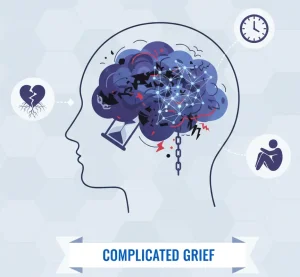Overview
Diagnosis
Grieving is a unique experience for every person, and identifying when normal grief develops into complicated grief can be challenging. There’s currently no universal agreement among mental health experts on the exact time frame required before complicated grief can be diagnosed.
Complicated grief may be considered when intense grief persists for months after a loved one’s death. Some professionals diagnose it when symptoms remain strong, ongoing, and disabling beyond 12 months.
While complicated grief shares similarities with major depression, there are also important differences. In some cases, both conditions occur together. A comprehensive medical and psychological evaluation helps ensure an accurate diagnosis and the right treatment plan.
Treatment
The choice of treatment depends on individual symptoms and circumstances.
Psychotherapy
A specialized form of psychotherapy known as complicated grief therapy is commonly used. It shares techniques with therapies for depression and PTSD but focuses specifically on unresolved grief. It can be done individually or in group settings.
During therapy, individuals may:
-
Learn about complicated grief and its treatment
-
Explore topics such as grief reactions, adjustment to loss, and life goals
-
Revisit memories and imagined conversations with the deceased to reduce distress
-
Process thoughts and emotions related to the loss
-
Strengthen coping skills
-
Work through guilt and self-blame
Other psychotherapy methods may be recommended if depression or PTSD accompanies complicated grief.
Medications
Research on medications for complicated grief is limited. Antidepressants may be helpful for individuals who experience both depression and complicated grief.
Coping and Support
Professional treatment is important, but certain lifestyle and self-care practices can also help:
-
Stick to your treatment plan and attend therapy sessions regularly
-
Learn and apply stress-management techniques
-
Get enough sleep, eat healthily, and stay physically active
-
Avoid alcohol and recreational drugs
-
Seek comfort in spiritual or faith-based practices if meaningful to you
-
Stay connected with friends and family for emotional support
-
Prepare in advance for anniversaries or holidays that may trigger strong emotions
-
Learn new skills to increase independence and confidence
-
Join a grief support group, either locally or online, when ready
Preparing for Your Appointment
You can begin by contacting your primary doctor, who may refer you to a mental health professional for evaluation and treatment. Bringing a trusted friend or family member can help you remember important details from the visit.
Before your appointment, note down:
-
Symptoms and how long you’ve experienced them
-
Major life changes or stresses since your loss
-
Any diagnosed health conditions
-
All medications and supplements you take, including dosages
-
Questions you’d like to ask your doctor
Possible questions include:
-
Are my symptoms typical or more severe than expected?
-
Would psychotherapy help me?
-
Are medications an option, and what side effects might they have?
-
What self-care steps should I follow?
-
Are there local or online support groups you recommend?
-
How long will treatment take before I feel better?
-
Will I eventually feel like myself again?
What to Expect from Your Doctor
Your doctor or therapist may ask questions such as:
-
How often do you think about your loved one?
-
Do you feel you could have prevented their death?
-
Have you wished you had died along with them?
-
How well are you managing work, home, and relationships?
-
Have you faced other stresses or losses recently?
-
Do you have trouble eating or sleeping?
-
What kind of social support do you have?
-
Have you been treated for mental health conditions before?
-
Have you had thoughts of harming yourself or others?
-
Do you drink alcohol or use recreational drugs?
Advertisement

